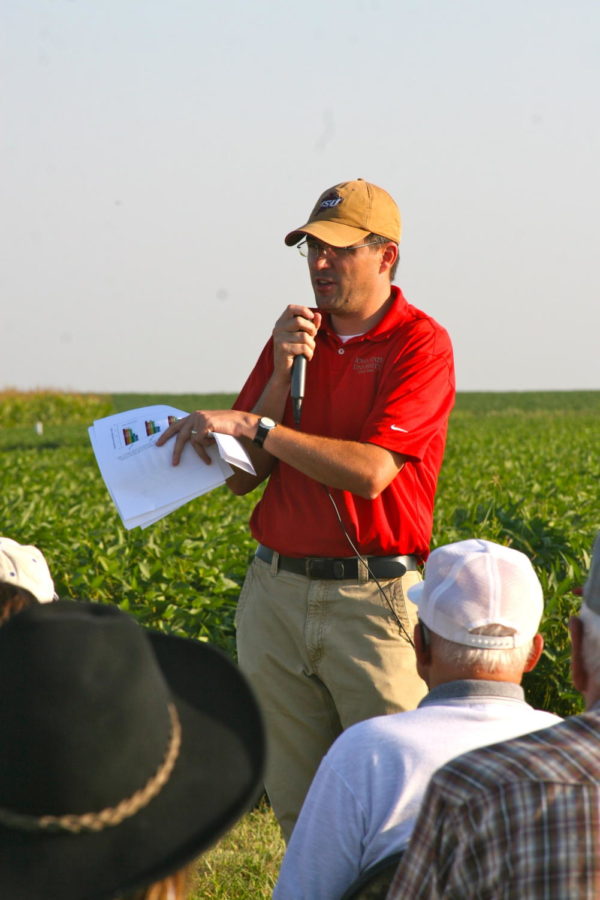Iowa Learning Farms celebrate 10 years, project growth in 2014
Matt Helmers speaks at a public field day on Sept. 1, 2011. Helmers is an associate professor in agriculture and biosystems engineering is co-manager of Iowa Learning Farms which is working to improve conservation practices throughout the state and nation.
February 3, 2014
Iowa Learning Farms is celebrating their ten-year anniversary during 2014. The original plan was originally a five-year program. Over the years, though, the program has become something much larger.
The program started in October 2004 and ideas were just being tossed around, and in 2005, the program kicked off.
There was a steering committee in 2004, which had many innovative and engaging ideas, but it was not until 2005 that the team had enough staff to get the program lifted off the ground.
Many strategies and practices have developed over the years, and one of the differences is the Iowa Learning Farms’ logo. The logo was originally “Iowa Learning Farm” and was switched to “Farms” because of the mission of the program. The goal is to reach out to as many farmers as possible, which the original name wasn’t clearly showing.
The main goal for the future is to concentrate on farmer partner conservation. In 2005, there were about 20 conservation demonstrations and the number has been increasing over the years. There are also many new methods about publicizing the program.
“Communication is key to spread the word and to promote the new conservation ideas,” said Jacqueline Comito, the Iowa Learning Farms director.
The program needed multiple learning strategies. They looked at previous data before they started their own unique strategy.
The networks and support systems are important to the continuity of the program, as well. It is also important to hear the information from farmers because they would have more experience about how to put the program into place.
Comito described that communication as “farmer to farmer and Iowan to Iowan.”
Iowa Learning Farms has held 743 events and has talked to about 80,000 people since 2005. Iowa Learning Farms wants to keep increasing those numbers. They hold all kinds of events, too.
Some of the events include field day workshops, listening sessions and demonstrations.
Thirty-two field day workshops were held in 2013, and 2,058 people participated. For all of the specific events, Iowa Learning Farms changes the context to affect certain viewers. For example, when the program holds seminars for children, Iowa Learning Farms brings in dogs to help keep their attention.
Since 2008, 85 percent of farmers who have participated in the Iowa Learning Farms field days have changed or improved their farming practices.
There are a lot of new ideas and innovations that the program is going to try and promote in 2014. One of the more-successful ideas that the program issued in 2013 was cover crops. Cover crops are used to promote soil health on farmers’ fields.
At first it was hard to get the farmers to take initiative, but 30,422 farmers used cover crops in 2013, alone.
One of the many ways Iowa Learning Farms is trying to promote their program is by using online resources. Their website has been used by the community to collect fact sheets, to watch videos and to share articles on conservation practices.
The program also uses a blog to keep in touch with farmers. Iowa Learning Farms has had around 88,000 views on YouTube videos, as well.
There are many strategies that the program wants to work on, and that includes reaching out to those farmers who have yet used many conservation practices. Education, outreach and incentive are all important qualities of the Iowa Learning Farms program.
“Conservation is not volunteer [work], it is a standard practice among Iowans, particularly farmers,” Comito said. “We are all in this together.”

















